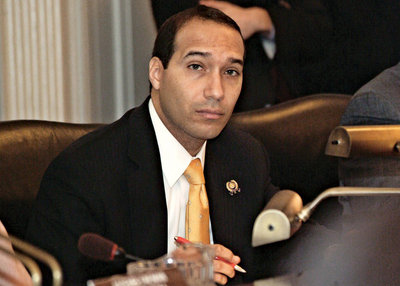HOBOKEN – One of the biggest political issues in Hoboken right now is whether to decontrol certain rent controlled units in town when a current tenant moves out. A referendum on Tuesday’s ballot would make the change. A landlords’ group wants people to vote “Yes” on measure; tenant activists want people to vote “No.”
So far, Mayor Dawn Zimmer has weighed in that she is against the change and supports a “No” vote. One of her opponents in Tuesday’s mayoral election, Tim Occhipinti, has said he is for the change and thus supports a “Yes.”
But the third candidate, Assemblyman Ruben Ramos, has said only that he thinks a compromise should have been worked out so that the measure would not be on the ballot.
When pressed on Wednesday, Ramos said that — like Zimmer — he will vote “no” on the change.
The referendum, which will appear on the ballot as Hoboken Public Question #2, would permanently remove rent control from buildings with four units of housing or fewer when a current tenant moves out and add a one-time decontrol for buildings with five or more units.
The question has been the topic of heated debate between tenant advocates represented by the Hoboken Fair Housing Association (HFHA) and property owners and developers represented by the Mile Square Taxpayers Association (MSTA). MSTA gathered enough signatures to have it placed on the ballot, and wrote the language that voters will read on Nov. 5, which is why Ramos said he’s voting against it.
“The wording is one-sided,” he said. “I think it needs more protections for current tenants.”
Ramos has said that better governing could have found a compromise between tenants and landlords long before a referendum was necessary.
“I like to bring all sides to the table and resolve things in a way that’s beneficial to everyone, and that’s what I would have done before this had to come to the point where it’s on the ballot,” he said.
However, it has been hard to make any changes to rent control over the years. Not long ago, the City Council formed a committee to consider some technical changes to the law. Ultimately, it took them more than two years of discussions and compromises to come up with something that got approved. – Dean DeChiaro
Hoboken mayoral candidate Ramos gives his opinion of Hoboken rent control referendum
